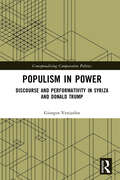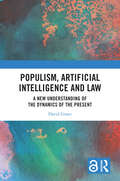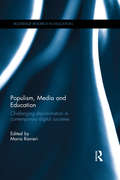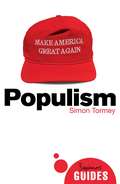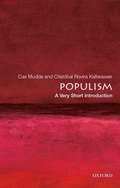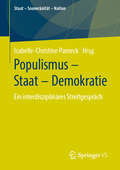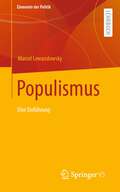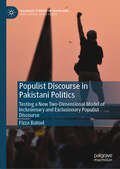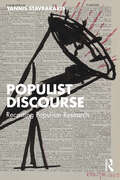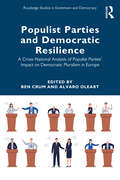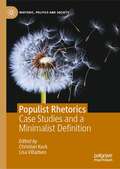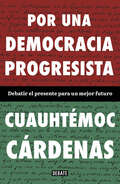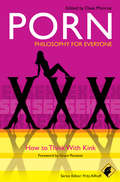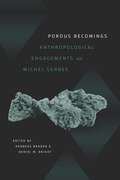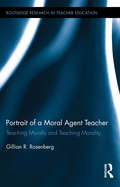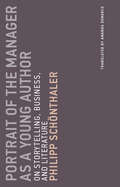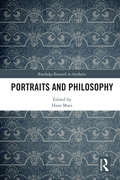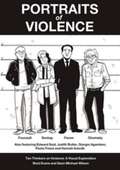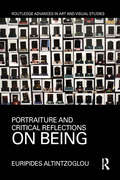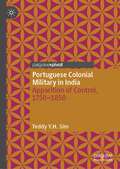- Table View
- List View
Populism in Power: Discourse and Performativity in SYRIZA and Donald Trump (Conceptualising Comparative Politics)
by Giorgos VenizelosShifting attention away from policy achievements and effects on democracy, this book focuses on the charismatic function of populist discourse – comprising antagonistic narratives, transgressive style and appeals to the common people. The book puts forward an integrative approach that brings together discourse analysis, analysis of digital media, in-depth interviews and ethnographic methods, and places into comparative perspective the cases of SYRIZA in Greece and Donald Trump in the United States. Theorising populism through the lens of collective identification, Venizelos places the rhetorical and emotional dynamics of populist performativity at the core of the analysis, offering a rigorous yet flexible conceptulisation of populism in power. Against theoretical expectations, findings suggest that both SYRIZA and Trump retained, to different degrees, their populist character in power, although their style and vision differed vastly. This book urges researchers, journalists and politicians to adopt a reflexive approach to analysing the political implications of populism for politics, polity and society, and to challenge the normatively charged definitions that are uncritically reproduced in the public sphere. It will appeal to researchers of political theory, populism, comparative politics, sociologists and ethnographers.
Populism in Power: Discourse and Performativity in SYRIZA and Donald Trump (Conceptualising Comparative Politics)
by Giorgos VenizelosShifting attention away from policy achievements and effects on democracy, this book focuses on the charismatic function of populist discourse – comprising antagonistic narratives, transgressive style and appeals to the common people.The book puts forward an integrative approach that brings together discourse analysis, analysis of digital media, in-depth interviews and ethnographic methods, and places into comparative perspective the cases of SYRIZA in Greece and Donald Trump in the United States. Theorising populism through the lens of collective identification, Venizelos places the rhetorical and emotional dynamics of populist performativity at the core of the analysis, offering a rigorous yet flexible conceptulisation of populism in power. Against theoretical expectations, findings suggest that both SYRIZA and Trump retained, to different degrees, their populist character in power, although their style and vision differed vastly.This book urges researchers, journalists and politicians to adopt a reflexive approach to analysing the political implications of populism for politics, polity and society, and to challenge the normatively charged definitions that are uncritically reproduced in the public sphere. It will appeal to researchers of political theory, populism, comparative politics, sociologists and ethnographers.
Populism, Artificial Intelligence and Law: A New Understanding of the Dynamics of the Present
by David GrantPolitical systems across much of the West are now subject to populist disruption, which often takes an anti-Constitutional form. This interdisciplinary book argues that the current analysis of anti-Constitutional populism, while often astute, is focused far too narrowly. It is held here that due to an obscured complex of dynamics that has shaped the history of the West since its inception and which remains active today, we do not understand the present. This complex not only explains the current disruptions across the fields of contemporary religion, politics, economics and emerging artificial intelligence but also how these disruptions derive each from originary sources. This work thereby explains not only the manner in which this complex has functioned across historical time but also why it is that its inherent, unresolvable flaws have triggered the shifts between these key fields as well as the intractability of these present disruptions. It is this flawed complex of factors that has led to current conflicts about abortion reform, political populism, the failure of neoliberalism and the imminent quantum shift in generative artificial intelligence. It is argued that in this, law is heavily implicated, especially at the constitutional level. Presenting a forensic examination of the root causes of all these disruptions, the study provides a toolbox of ideas with which to confront these challenges. This is a book of originality and significance, which will make fascinating reading for academics and researchers working in the areas of Socio-legal Studies, Legal Philosophy, Political Science, Theology, AI and Neuroscience.The Open Access version of this book, available at http://www.taylorfrancis.com, has been made available under a Creative Commons Attribution-Non Commercial-No Derivatives (CC-BY-NC-ND) 4.0 license.
Populism, Media and Education: Challenging discrimination in contemporary digital societies (Routledge Research in Education)
by Maria RanieriBased on a major research project funded by the European Commission, Populism, Media and Education studies how discriminatory stereotypes are built online with a particular focus on right-wing populism. Globalization and migration have led to a new era of populism and racism in Western countries, rekindling traditional forms of discrimination through innovative means. New media platforms are being seen by populist organizations as a method to promote hate speech and unprecedented forms of proselytism. Race, gender, disability and sexual orientation are all being used to discriminate and young people are the preferred target for populist organizations and movements. This book examines how media education can help to deconstruct such hate speech and promote young people’s full participation in media-saturated societies. Drawing on rich examples from Austria, Belgium, Bulgaria, France, Italy, Slovenia, and the UK - countries characterized by different political and cultural contexts – Populism, Media and Education addresses key questions about the meaning of new populism, the nature of e-engagement, and the role of education and citizenship in the digital century. With its international and interdisciplinary approach, this book is essential reading for academics and students in the areas of education, media studies, sociology, cultural studies, political sciences, discrimination and gender studies.
Populism: A Beginner's Guide (Beginner's Guides)
by Simon TormeyEvery day we hear that the rise of populism threatens democracy around the world, but is this really true? Did populism cause the current crisis, or is it the other way around? To understand the state of our politics right now, we must get to grips with this contested concept. Simon Tormey breaks down the defining aspects of populism, what sets it apart from other styles of politics, and what – if anything – we ought to do about it.
Populism: A Very Short Introduction (Very Short Introductions)
by Cristóbal Rovira Kaltwasser Cas MuddePopulism is a central concept in the current media debates about politics and elections. However, like most political buzzwords, the term often floats from one meaning to another, and both social scientists and journalists use it to denote diverse phenomena. What is populism really? Who are the populist leaders? And what is the relationship between populism and democracy? This book answers these questions in a simple and persuasive way, offering a swift guide to populism in theory and practice. <P><P> Cas Mudde and Crist bal Rovira Kaltwasser present populism as an ideology that divides society into two antagonistic camps, the "pure people" versus the "corrupt elite," and that privileges the general will of the people above all else. They illustrate the practical power of this ideology through a survey of representative populist movements of the modern era: European right-wing parties, left-wing presidents in Latin America, and the Tea Party movement in the United States. The authors delve into the ambivalent personalities of charismatic populist leaders such as Juan Domingo Peron, H. Ross Perot, Jean-Marie le Pen, Silvio Berlusconi, and Hugo Chavez. If the strong male leader embodies the mainstream form of populism, many resolute women, such as Eva Peron, Pauline Hanson, and Sarah Palin, have also succeeded in building a populist status, often by exploiting gendered notions of society. <P><P> Although populism is ultimately part of democracy, populist movements constitute an increasing challenge to democratic politics. Comparing political trends across different countries, this compelling book debates what the long-term consequences of this challenge could be, as it turns the spotlight on the bewildering effect of populism on today's political and social life.
Populism: Performance, Political Style, And Representation (Key Concepts in Political Theory)
by Benjamin MoffittPopulism is the key political phenomenon of the 21st century. From Trump to Brexit, from Chávez to Podemos, the term has been used to describe leaders, parties and movements across the globe who disrupt the status quo and speak in the name of ‘the people’ against ‘the elite’. Yet the term remains something of a puzzle: poorly understood, vaguely defined and, more often than not, used as a term of abuse. In this concise and engaging book, leading expert Benjamin Moffitt cuts through this confusion. Offering the first accessible introduction to populism as a core concept in political theory, he maps the different schools of thought on how to understand populism and explores how populism relates to some of the most important concepts at the heart of political debate today. He asks: what has populism got to do with nationalism and nativism? How does it intersect with socialism? Is it compatible with liberalism? And in the end, is populism a good or bad thing for democracy? This book is essential reading for anyone – from students and scholars to general readers alike – seeking to make sense of one the most important and controversial issues in the contemporary political landscape.
Populismus – Staat – Demokratie: Ein interdisziplinäres Streitgespräch (Staat – Souveränität – Nation)
by Isabelle-Christine PanreckZwar fällt die Populismusforschung auf den ersten Blick ins Kerngebiet der Politikwissenschaft, aber keine Geistes- oder Sozialwissenschaft verschließt sich der Debatte. Dabei erfolgt eine interdisziplinäre Verknüpfung der einzelnen Diskussionsfäden bislang nur vereinzelt. Der Sammelband stößt in die Lücke, indem er erstmals Vertreterinnen und Vertreter der Kunst-geschichte, Ökonomie, Philosophie, Politikwissenschaft, Politolinguistik, Städtebau/Architektur und Theologie zum Streitgespräch versammelt.
Populismus: Eine Einführung (Elemente der Politik)
by Marcel LewandowskyDas Lehrbuch bietet eine einführende Darstellung des Populismus in allen relevanten Facetten. Namentlich adressiert das Buch seine unterschiedlichen Manifestationen (als Ideologie, Parteiprogramm und individuelle Einstellung), stellt den Populismus in vergleichender Perspektive vor und analysiert die Ursachen für den Wahlerfolg populistischer Parteien. Ferner diskutiert das Buch die Auswirkungen populistischer Parteien auf die Demokratie und den Parteienwettbewerb.
Populist Discourse in Pakistani Politics: Testing a New Two-Dimensional Model of Inclusionary and Exclusionary Populist Discourse (Palgrave Studies in Populisms)
by Fizza BatoolThis book presents a new theoretical model for mapping how populist leaders construct &“the people&”, using simultaneous processes of inclusion and exclusion. Applying this model to Pakistan's distinctive political landscape, the work analyzes the populist discourse of Zulfikar Ali Bhutto and Imran Khan, highlighting the key similarities and differences in their construct. The comparative analysis underlines how Pakistan&’s political history, including the role of religion, the military, and dynastic politics, shapes populist politics in the country. By centering a non-Western case, this book challenges dominant frameworks and offers an accessible, comparative lens on populist discourse. It will be of interest to scholars and students of populism, Pakistani politics, and discourse analysis, as well as to those interested in the broader dynamics of democratization in hybrid political systems.
Populist Discourse: Recasting Populism Research
by Yannis StavrakakisPopulist Discourse: Recasting Populism Research offers a refreshingly innovative discourse theory perspective on populist phenomena. Reading this book will help you familiarize yourself with the historical genealogy of significant populist phenomena from the end of the 19th century onwards and with the main conceptual/theoretical accounts established to analyse them. Mainstream conceptualizations of populism in both academia and public discourse are critically discussed in order to map new, promising avenues for research. Inspired by the works of Ernesto Laclau and Chantal Mouffe, the book addresses current challenges within populism research and highlights the new directions that a conceptually nuanced, theoretically rigorous and historically informed discursive orientation can contribute to the contemporary study of populism. Without sacrificing attention to detail, strong bibliographical support and a focus on the future development of populism research, Populist Discourse is written in accessible language to engage populism scholars, advanced undergraduates and graduate-level students within the field of political science. Due to its interdisciplinary character, it will also appeal to readers associated with various politically informed area studies and the broader field of ideology and discourse analysis.
Populist Parties and Democratic Resilience: A Cross-National Analysis of Populist Parties’ Impact on Democratic Pluralism in Europe (Routledge Studies in Extremism and Democracy)
by Ben Crum and Alvaro OleartPopulist Parties and Democratic Resilience focuses on populist parties as the main agents of populism and examines when these parties turn anti-democratic and when they remain loyal to the democratic system. Following the Brexit referendum, the election of Donald Trump, and the rise of populist parties around the globe, many observers suggested that democracy was in serious trouble. Nevertheless, while some democratic systems have been seized by populists, most of them have proven resilient. In this volume, the authors identify the conditions under which populist parties become inimical to political and societal pluralism. They offer in-depth analyses of the trajectory of populist parties in eleven European Union countries (Austria, Belgium, Czech Republic, France, Germany, Hungary, Italy, The Netherlands, Poland, Romania, and Spain). The book shows that, reflecting the diversity of national contexts, there are multiple pathways whereby populist parties’ power can remain contained and subject to democratic checks and balances. Moreover, populist parties can — at times voluntarily, at other times by force of external conditions — come to adhere to the democratic rules of the game. On this basis, the volume outlines different ways in which European democracies can successfully accommodate populist parties through strategies that carefully navigate between the extremes of uncritical acceptance and outright ostracization. Drawing on the literature on democratic theory and comparative politics, this book directly contributes to the public debate on the state of democracy in Europe. It will be of interest to researchers of comparative politics, European politics, party politics, democracy, and populism.
Populist Rhetorics: Case Studies and a Minimalist Definition (Rhetoric, Politics and Society)
by Christian Kock Lisa VilladsenThis book proposes a unified approach to populism that sees it as a primarily rhetorical concept. Populism is on the rise worldwide with both populist leaders and movements gaining power, and the term “populism” resounds in political debate, journalism, and scholarship. Populism as a phenomenon seems to instantiate perennial issues besetting rhetoric (e.g., the charges of manipulation, exclusive reliance on opinion over knowledge, and abuse of emotional appeals), yet relatively little research on populism has emerged from the discipline of rhetoric. This volume investigates the theory and practice of populism under the heading of rhetoric but as an interdisciplinary effort involving scholars in rhetoric as well as neighbouring disciplines such as political science and sociology. Seven case studies covering Germany, Greece, Hungary, Italy, UK, USA, and Venezuela offer conceptual discussions as well as close analyses applying both historical and theoretical approaches. In the introduction, the editors outline the problem of populism and their project, presenting the book’s wide-spanning case-based explorations. In an afterword they seek to distil a “minimal” rhetorical definition of populism. The claim or pretense to speak for “the people” emerges as the feature that connects the highly diverse instances studied in the book—and populisms in general, the editors hypothesize. They argue that this prevalent rhetorical move, often glossed over as unremarkable and banal, is in principle more debatable and deserving of more vigilant scrutiny than usually assumed.
Por qué miramos a los animales
by John BergerNadie como el premio Booker John Berger para enseñarnos a ver y a vernos. «Desde D. H. Lawrence no ha habido un escritor como Berger, capaz de ofrecer al mundo tal atención sobre los problemas humanos más disímiles, con una sensualidad que no renuncia a los imperativos de la conciencia y la responsabilidad».Susan Sontag John Berger revolucionó nuestra manera de ver el arte, la sociedad y la naturaleza, animándonos a mirar el mundo como si se tratara de la primera vez. Este libro es una buena muestra de ello: variando en tono desde la anécdota tierna hasta el ensayo profundo, el ganador del Premio Booker se pregunta cómo y por qué nos hemos vuelto incapaces de ver realmente a los animales, a los que hemos convertido en muñecos, juguetes y personajes de cuentos infantiles. Berger nos ofrece un diagnóstico, pero también una salida: la solidaridad entre oprimidos, la creación de un lenguaje común y una nueva mirada emancipadora tanto para el que mira como para el que es mirado.Alfaguara recoge los ensayos, algunos inéditos en castellano, que Berger dedicó a nuestra relación con los animales y a diversas luchas sociales en un libro que muestra una vez más la sensibilidad y el compromiso del autor en temas de intensa relevancia actual. La crítica ha dicho...«Su obra parece labrada con una precisión de relojero, y una intimidad que podría confundirse con ternura».The New York Times Book Review «Fue el Leonard Cohen de otra clase de rotunda melancolía: la de la tristeza (social, íntima) que provoca el auténtico saber en mitad de la sociedad capitalista de fauces abiertas y hambre incansable».Diego Medrano, El Comercio«Berger es el fecundo, sugerente e irónico escritor de las verdades».Manuel Rivas «Una de las voces esenciales para comprender el estado de nuestra sociedad [...]. Combina a la perfección compromiso y reflexión».El Confidencial «Sus contemporáneos más cercanos en términos de audacia estética podrían ser Umberto Eco o el tardío W. G. Sebald, pero resulta difícil compararlo a cualquier autor inglés del último medio siglo. Berger, simplemente, rompió todos los moldes».The Guardian «Fue la voz de los frágiles, residuos del mundo moderno a los que su obra otorgó dignidad de reyes [...]. Poeta, novelista, ensayista y crítico de arte, toda su obra literaria es el testimonio de alguien que contempla un universo que se desvanece ante sus ojos».Javier Rodríguez Marcos, El País «Un faro de luz tenue pero inagotable, constante, esperanzada».Àlex Susana, Ara «Los libros de Berger poseen la peculiar cualidad de parecer libros solo por azar. Hechos de palabras, las portan, sin embargo, con indulgencia, casia regañadientes, como si igual pudieran estar hechos de lienzo y pintura o, aún mejor, de polvo y paja, barro y hueso».Herald Tribune
Por una democracia progresista
by Cuauhtémoc CárdenasLa Revolución Mexicana es indetenible, ya que su propósito siempre ha sido erigir un pueblo esencialmente democrático. Figura central de la transición a la democracia en nuestro país y dirigente de la izquierda mexicana, Cuauhtémoc Cárdenas, en este nuevo libro, hace una revisión histórica y crítica del proceso revolucionario iniciado en 1910. Con un desglose de los principales documentos, analiza las diversas etapas, desde los antecedentes, la fase armada (1910-1920), el periodo de estabilización (1920-1934), el momento más alto de las realizaciones revolucionarias (1934- 1940), el declive (1941-1982) y el ciclo del desmantelamiento institucionalizado (1982-2018). Por una democracia progresista demuestra que la Revolución Mexicana es una revolución viva, cuyo propósito sigue siendo la edificación de una amplia, sólida y perdurable democracia. Así, a partir de argumentos rotundos y una consistente visión del futuro, concluye que la nación atraviesa por una crisis institucional donde debe volverse a los principios y a la ideología de la Revolución, pues todavía propone soluciones inmediatas y le resta mucho camino por andar.
Porn - Philosophy for Everyone
by Fritz Allhoff Gram Ponante Dave MonroeThis anthology takes the ever-controversial discussion of pornography out of solely academic circles; it expands the questions about porn that academics might tackle and opens the conversation to those who know it best--the creators and users of porn.Features essays on non-traditional issues in porn, including celebrity sex tapes, virtual sex, S&M, homosexual porn, and technology's impact on the porn industryFeatures fascinating insights from psychologists, a lawyer, and an English professor, as well as industry insiders such as Dylan RyderA fun, entertaining, and philosophically provocative approach to pornography, written for the general reader
Porous Becomings: Anthropological Engagements with Michel Serres
by Andreas Bandak and Daniel M. KnightOne of the foremost intellectuals of his generation, French philosopher of science Michel Serres (1930–2019) broke free from disciplinary dogmas. His reflections on science, culture, technology, art, and religion have proved foundational to scholars across the humanities. The contributors to Porous Becomings bring the inspirational and enigmatic world of Serres to the attention of anthropology. Through ethnographic encounters as diverse as angels and religious conversion in Ethiopia, the percolation of war in Bosnia, and incarcerated bodies crossing the Atlantic, the contributors showcase how Serres’s interrogation of the fundamentals of human existence opens new pathways for anthropological knowledge. Proposing the notion of "porosity" to characterize permeability across boundaries of time, space, literary genre, and academic discipline, they draw on Serres to map the constellations that connect humans, time, technology, and planet Earth. The volume concludes with a conversation between the editors and Vibrant Matter author Jane Bennett.Contributors. Andreas Bandak, Jane Bennett, Tom Boylston, Steven D. Brown, Matei Candea, Alberto Corsín Jiménez, David Henig, Michael Jackson, Daniel M. Knight, Celia Lowe, Morten Nielsen, Stavroula Pipyrou, Elizabeth Povinelli, Andrew Shryock, Arpad Szakolczai
Portrait of a Moral Agent Teacher: Teaching Morally and Teaching Morality (Routledge Research in Teacher Education)
by Gillian R. RosenbergTeaching morally and teaching morality are understood as mutually dependent processes necessary for providing moral education, or the communication of messages and lessons on what is right, good and virtuous in a student’s character. This comprehensive and contextualized volume offers anecdotes and experiences on how an elementary schoolteacher envisions, enacts, and reflects on the ethical teaching and learning of her students. By employing a personally developed form of moral education that is not defined by any particular philosophical or theoretical orientation, this volume relates that classroom-based moral education can, therefore, be conceived of and promoted as moral agency. Accentuated by the teacher’s voice to offer the experience of being in the classroom, this volume enables others to transfer relevant practices to their own teaching contexts.
Portrait of the Manager as a Young Author: On Storytelling, Business, and Literature (Untimely Meditations #12)
by Philipp SchonthalerWhat happens to the relationship between business and literature when storytelling becomes a privileged form of communication for organizations. Corporations love a good story. Microsoft employs a chief storyteller, who heads a team of twenty-five corporate storytellers. IBM, Coca-Cola, and the World Bank are among other organizations that have worked with storytelling methods. And, of course, Steve Jobs was famous for his storytelling. Today, narrative is a privileged form of communication for organizations. In Portrait of the Manager as a Young Author, Philipp Schönthaler explains this unlikely alliance between business and storytelling. The contradictions are immediately apparent. If, as the philosopher Hans Blumenberg writes, stories are told to pass the time, managers would seem to have little time to spare. And yet, Schönthaler reports, stories are useful in handling complexity. When digital information flows too quickly and exceeds the capacity of the human brain, narrative can provide communicative efficiency and effectiveness. Words and numbers both vouch for truth, are both instrumentalized by management, and are inextricably interdependent. What happens, if narrative becomes ubiquitous? Does the commercialization of narratives have an effect on literature? Through the lens of storytelling, Schönthaler explores the relationship between economics and literature and describes a form of writing that takes place in their shared spheres. Most books on storytelling in the corporate world are written by business writers; this book offers the perspective of an award-winning literary author, who considers both the impact of storytelling on business and the impact of business on literature.
Portrait: Portraits Of Henri Cartier-bresson (Lit Z)
by Jean-Luc NancyThis book examines the practice of portraits as a way in to grasping the paradoxes of subjectivity. To Nancy, the portrait is suspended between likeness and strangeness, identity and distance, representation and presentation, exactitude and forcefulness. It can identify an individual, but it can also express the dynamics by means of which its subject advances and withdraws.The book consists of two extended essays written a decade apart but in close conversation, in which Nancy considers the range of aspirations articulated by the portrait. Heavily illustrated, it includes a newly written preface bringing the two essays together and a substantial Introduction by Jeffrey Librett, which places Nancy’s work within the range of thinking of aesthetics and the subject, from religion, to aesthetics, to psychoanalysis.Though undergirded by a powerful grasp of the philosophical and psychoanalytic tradition that has rendered our sense of the subject so problematic, Nancy’s book is at heart a delightful, unpretentious reading of three dozen portraits, from ancient drinking mugs to recent experimental or parodic pieces in which the artistic representation of a sitter is made from their blood, germ cultures, or DNA.The contemporary world of ubiquitous photos, Nancy argues, in no way makes the portrait a thing of the past. On the contrary, the forms of appearing that mark the portrait continue to challenge how we see the bodies and representations that dominate our world.
Portraits and Philosophy (Routledge Research in Aesthetics)
by Hans MaesDespite its huge popularity, portraiture hasn’t received much philosophical attention. While there are countless art historical studies of portraiture, including self-portraiture and group-portraiture, contemporary philosophy has largely remained silent on the subject. This book brings together philosophers and philosophically minded art historians with different areas of expertise to discuss this enduring and continuously fascinating genre. The essays in this volume are grouped into thematic sections, each of which is guided by numerous research questions relevant to the genre of portraiture. Part I explores the boundaries of portraiture. What makes something a portrait? In what way is it similar to and different from other genres? How have artists pushed the limits and conventions of the portraiture? How does the recent vogue of selfies relate to the tradition of self-portraiture? Part II responds to questions about empathy and emotion in portraiture. How do artists express attitudes and emotions towards sitters of their portraits? Why are we moved by certain portraits and not so much by others? In Part III, the contributors address questions about fiction and depiction. Do portraits fall within the domain of non-fiction? Can authenticity in portraiture be achieved if portraits necessarily involve posing? Finally, Part IV grapples with the following question: What are the moral dimensions of the relation between artist, sitter, patron, and audience?
Portraits from Memory: And Other Essays (Routledge Classics)
by Bertrand Russell‘I have come to think that one of the main causes of trouble in the world is dogmatic and fanatical belief in some doctrine for which there is no adequate evidence.’ – Bertrand Russell, Portraits from Memory Portraits from Memory is one of Bertrand Russell’s most self-reflective and engaging books. Whilst not intended as an autobiography, it is a vivid recollection of some of his celebrated contemporaries, such as George Bernard Shaw, Sidney and Beatrice Webb and D. H. Lawrence. Russell provides some arresting and sometimes amusing insights into writers with whom he corresponded. He was fascinated by Joseph Conrad, with whom he formed a strong emotional bond, writing that his Heart of Darkness was not just a story but an expression of Conrad’s ‘philosophy of life’. There are also some typically pithy Russellian observations; H. G. Wells ‘derived his importance from quantity rather than quality’, whilst after a brief and fraught friendship Russell thought D. H. Lawrence ‘had no real wish to make the world better, but only to indulge in eloquent soliloquy about how bad it was’. This engaging book also includes some of Russell’s customary razor-sharp essays on a rich array of subjects, from his ardent pacifism, liberal politics and morality to the ethics of education, the skills of good writing and how he came to philosophy as a young man. These include ‘A Plea for Clear Thinking’, ‘A Philosophy for Our Time’ and ‘How I Write’. Portraits from Memory is Russell at his best and will enthrall those new to Russell as well as those already well-acquainted with his work. This Routledge Classics edition includes a new foreword by the Russell scholar Nicholas Griffin, editor of The Selected Letters of Bertrand Russell.
Portraits of Violence: An Illustrated History of Radical Critique
by Robert Brown Sean Michael Wilson Carl Thompson Brad Evans Mike Medaglia Chris MackenzieBringing together established academics and award-winning comic book writers and illustrators, Portraits of Violence illustrates the most compelling ideas and episodes in the critique of violence. Hannah Arendt, Franz Fanon, Jacques Derrida, Edward Said, Paolo Freire, Michel Foucault, Susan Sontag, Noam Chomsky, Judith Butler, and Giorgio Agamben each have ten pages to tell their story in this innovative graphic title.
Portraiture and Critical Reflections on Being (Routledge Advances in Art and Visual Studies)
by Euripides AltintzoglouThis book analyzes the philosophical origins of dualism in portraiture in Western culture during the Classical period, through to contemporary modes of portraiture. Dualism – the separation of mind from body - plays a central part in portraiture, given that it supplies the fundamental framework for portraiture’s determining problem and justification: the visual construction of the subjectivity of the sitter, which is invariably accounted for as ineffable entity or spirit, that the artist magically captures. Every artist that has engaged with portraiture has had to deal with these issues and, therefore, with the question of being and identity.
Portuguese Colonial Military in India: Apparition of Control, 1750--1850
by Teddy Y.H. SimThis book explores and analyzes developments in the military institution, military engagements as well as the larger security environment of (including non-war violence and maritime regions linking to) the Portuguese Empire in India. These developments occurred under the onslaught of the early modern globalization. The research shows that far from being dilapidated or archaic, the Portuguese colonial military there kept up with some developments in technology and organization in a competitive environment. Although the colonial military was not the most important reason in accounting for the survival of the Portuguese Estado da Índia, nor was the military profession the most lucrative occupation, the Portuguese experience gave indication of how a colonial state and society was able to survive against coalescing threats from the position of weakness. Located in the period and geographical region of the wax and waning of the Mughal and Maratha empires, Portuguese India was not necessarily a more violent place than the surrounding territories although resistance to and uprising against the Portuguese was usually underestimated. Beginning from the attempt at political and military centralization (and standardization) in the eighteenth century, the abolition of the army of the Estado da Índia in the nineteenth marked nominally the end of an era that may have a reverberation on the pacifist perception of Goa today.
